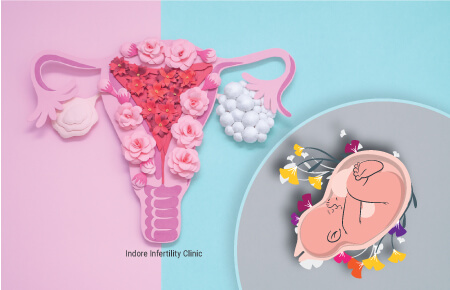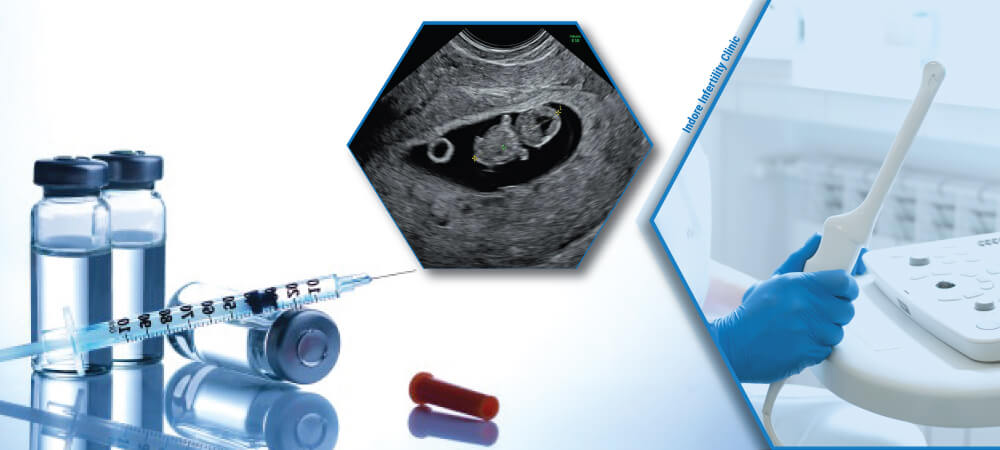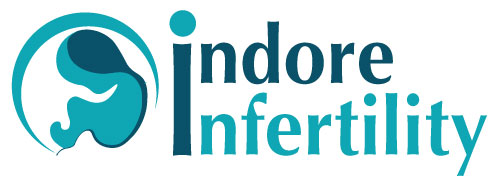

PCOS patients often get discouraged while trying to get pregnant. Here is a guide to how IVF Protocols can assist PCOS patients in fulfilling their motherhood dream.
How does PCOS cause infertility ?
PCOS or Polycystic Ovarian Syndrome, is an endocrine disorder that affects a females fertility and ability to get pregnant. PCOS affects ovulation and causes ovulatory dysfunction. Because ovulation does not occur on time or does not occur at all, the chances of pregnancy become less.
Why do women with PCOS find it difficult to achieve pregnancy ?
Women with PCOS find it difficult to get pregnant because ovulation does not occur in a timely manner or does not occur at all. This is the reason why women cannot time their ovulation which causes difficulty in timing the fertile period. If a women with PCOS is able to conceive, incidence of early pregnancy loss (early abortion or early miscarriage) is also higher than women who do not have PCOS. This also adds to the difficulty in continuing pregnancy.
How does IVF help women with PCOS to get pregnant ?
During the process of IVF, external medication in form of injections is given to the patient to control the formation of eggs and then release of eggs from the ovaries at the right time. The problem of ovulatory dysfunction is therefore corrected with ovarian stimulation which is a part of IVF.
Hormones are controlled by medication during the process of IVF either before ovulation or after embryo transfer and hence there is less possibility of hormonal imbalance during early pregnancy, this reduces the chances of early pregnancy loss in women with PCOS.

What is IVF stimulation protocol ?
IVF Stimulation protocol is the manner in which ovaries are stimulated with injections during an IVF cycle. The purpose of ovarian stimulation is to stimulate or assist the ovaries to produce multiple follicles ( follicles are the sacs that contains ovum or egg) during a menstrual cycle. Ovarian stimulation can also control the timing of ovulation or final maturity of the eggs. This allows IVF specialist to choose appropriate time to retrieve or harvest the mature follicles and pass them to the IVF Lab.
There are many kinds of stimulation protocols for example agonist protocol, antagonist protocol, duostim protocol etc. The best IVF specialists are those, who know how to stimulate a patients ovaries based on patients medical history to retrieve optimum amount of follicles without causing any risk to the patient.
Is the IVF stimulation protocol different for women with PCOS ?
Antagonist protocol with minimum dose of Highly purified gonadotropin (HMG) or Recombinant FSH should be used in patients suffering from PCOS. This ensures that there is no risk of OHSS for patients with PCOS.
A step up protocol with gradually increasing levels of gonadotropins (Therefore known as step up protocol) is often used in PCOS. A step up protocol provides better control over the ovarian stimulation for patients of PCOS.
For trigger i.e. final maturation of oocytes, Agonist should be used and HCG should be avoided as HCG trigger may increase risk of OHSS.
Usually the protocol of choice for PCOS patient is IVF-Freeze All Protocol which means all embryos formed during an IVF cycle are cryopreserved and subsequently transferred in natural cycles later on is preferred as well in women with PCO.
All the above mentioned IVF Protocols, that is :
- Antagonist Protocol
- Step Up Protocol
- Agonist Trigger
- IVF Freeze All Protocol
Are used in women suffering from PCOS. These efforts will lead to better quality oocytes resulting in better quality blastocysts. Following these protocols will also eliminate the risk of Ovarian Hyperstimulation Syndrome (OHSS) in PCOS patients to a great extent.

Is there any difference in how IVF Cycles are planned for PCOS patients ?
PCOS patients typically need some or the other form of pre-IVF treatment or pre-IVF corrections like:
- weight reduction,
- controlled diet,
- regular exercise,
- ruling out and correcting high blood sugar levels
- correcting other metabolic dysfunction like hypothyroidism etc.
In some women with PCOS, menstrual cycles may be irregular, delayed or some may not be having spontaneous menstrual cycles at all. In these women, medicines may have to be given to make their cycles regular before starting IVF treatment.
So for PCOS patients, the time taken to undergo an IVF cycle may be longer as they may have to undergo some form of pre-ivf treatment for a couple of months. Patients should understand that such pre-IVF corrections will not only increase their IVF success rate, but also work towards long term benefit due to positive lifestyle changes. The best IVF doctors will make sure that patients are counselled about IVF cycle and it’s success based on severity of PCOS.
Is the IVF success rate different for women who have PCOS ?
If the correct IVF protocols are used, IVF success rates are similar in women who have PCOS as compared to those who do not have PCO. In fact, at times, because of higher number of oocytes or eggs retrieved and more embryos being formed, the cumulative pregnancy rates may be higher in women who have PCOS. Which means that because they have more embryos, they can try more number of times.
However it is often noted that women suffering from PCOS have average or poor quality of oocytes, which impacts the quality of embryo formed. It is better to undergo a pre-IVF treatment if suggested by Infertility specialist for a few months than to directly undergo IVF cycle just because it suits your timing.
Is the post embryo transfer period and medication any different for patients with PCOS ?
Post embryo transfer medicines or what is also known as Luteal Phase support is the same in PCOS and Non PCOS women. There is no difference in the type of medicine or frequency of medicine as compared to other patients.
Is pregnancy in PCOS women any different from patients who do not have PCO ?
No. There is no difference. However since most PCOS patients have higher BMI, it is advisable to always follow advice of gynaecologist in terms of diet and exercise. There is a slight chance of increased glucose intolerance during pregnancy in patients with PCOS due to higher BMI. Hence patients are advised to strictly follow doctor’s advice in terms of diet, exercise, medication and tests and like always, keep a constant note of fetal movement during the third trimester.
Embracing PCOS
PCOS is a condition that one has to live with throughout the reproductive life, hence it makes sense to embrace the condition and understand how one can lead a normal life.
Consider taking an opinion from a good reproductive medicine specialist if you are dealing with PCOS and wish to eventually get pregnant. It is best to understand the disease and how it can be managed early on.
WHATSAPP FOR MORE INFORMATION



